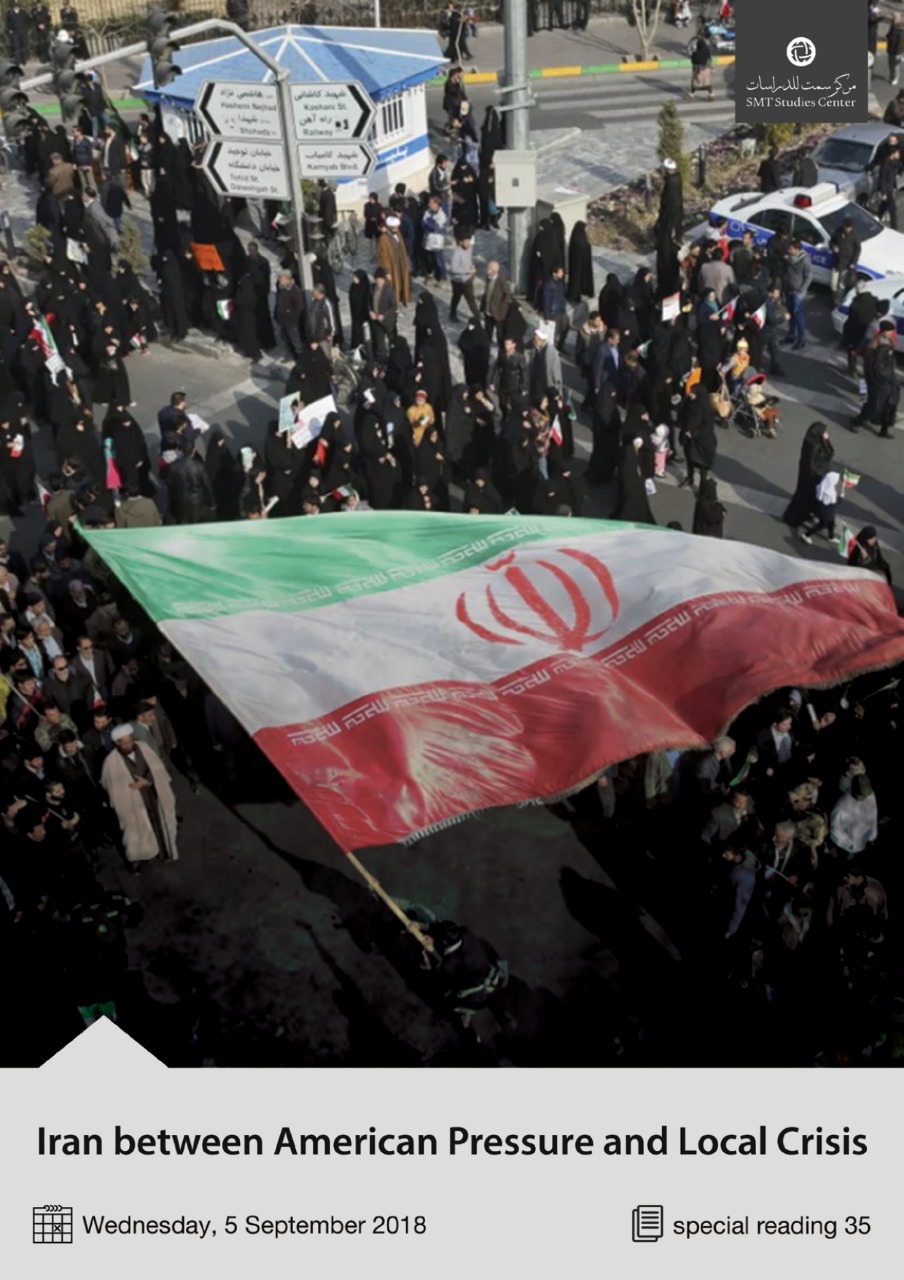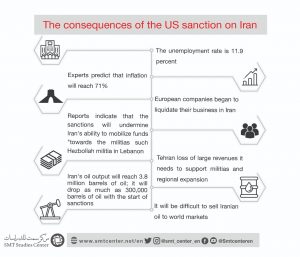Subscripe to be the first to know about our updates!

Iran between American Pressure and Local Crisis
The decision of US President Donald Trump to withdraw from the nuclear agreement is a new station in the dramatic course of American-Iranian relations. This decision has the consensus of a number of officials in the US administration with him, Herbert McMaster, security adviser for US national security says “The Iranian regime is nothing but a rogue system, There is also a need to combat Iran’s destabilizing activity, especially in Syria” The United States is working for preventing Tehran from supporting its proxies and stopping all Iranian tracks to develop nuclear weapons.
According to the deal, Iran has agreed to reduce the number of centrifuges used to enrich uranium, and Iran has pledged not to exceed that for ten years. Tehran also agreed to transfer the reactor Which is used in heavy water so as not to be able to produce plutonium, which can be used for military purposes, under the supervision of the International Atomic Energy Agency to conduct regular inspections of Iranian nuclear sites, and expanded the powers of inspectors and can Scan over 20 years the production of centrifuges.
Iranians concerns of the possibility of embarking on a serious economic war against Iran. The economic situation has been traumatized by Trump’s attitude toward the nuclear agreement, in addition to several concerns of Iranian security affairs of Iran.
Economic aspects of the crisis
The Iranian economy is suffers from a deep crisis, which represents an obstacle to President Hassan Rowhani during his second term, especially as poverty rates hit record highs, and the Iranian currency (Riyal) lost about two thirds of its value against the dollar during the first term of the spiritual presidency. The bleeding of the Iranian economy is growing because of massive secret budgets to support armed militias in the Middle East, compounded by four major problems that will tighten the blockade on Ruhani. This is linked to the influence of the Iranian Revolutionary Guard, which exceeds the authority of the Iranian president, who controls 40% of the size of the Iranian economy, most of which are directed to support armed militias in the Middle East. Meanwhile the deeper problem lies in the existence of a parallel economy of the Revolutionary Guards that is out of control. Such dilemma deepens the crises facing the Iranian economy.
Official reports revealed that Iran supports 12 armed militias in the world, based in Asia, the Arab region and some in Africa. The World Bank reports that the Iranian economy is suffering from structural problems related to wage inequality, unemployment and low supply of jobs, Iranian workers in factories and companies.

The new US sanctions target Iran’s oil sector and international energy companies operating in Tehran, raising energy prices on the world market as Iranian supplies fall. The rise in world oil prices is reflected in the US economy, especially with many of the challenges faced by US oil producing oil companies, which were relied upon to compensate for the shortfall in world oil supply after the loss of Iranian oil supplies, But this will be over the next four years.
Imposing more sanctions on Iran doubles the problem after trump decision to withdraw from the agreement. It means that the Iranian oil exports will fall to zero, all these fears are affecting the majority of Iranian society. On the war is not real Iran always has a military readiness in the missile defense and deterrent industries, and the Iranian armed forces, led by the Revolutionary Guard forces have been and are on standby.
International Trends of Trumps Decision
International situations toward Trumps decision varied according to the variation of interests of international actors.
European countries opposed Trump’s decision and considered it as a negative step will not contribute to stability in the region. “The governments of these countries remain committed to the implementation of the agreement and will work with all other parties concerned so that it remains so, including ensuring the continued economic benefits of the agreement to the Iranian people,” a joint statement was issued after Trump’s immediate decision states. The three countries made considerable efforts to convince Trump not to withdraw from the deal, France called to keep the agreement without any amendments.
French, German and British leaders held intensive political talks in April 2018 in order to persuade Trump to postpone his decision. The three countries issued a statement on April 29, A nuclear deal with Iran is the best way to prevent it from acquiring a nuclear weapon.
Trump administration has given priority to undermining the agreement and returning Iran to international isolation and sanctions. The European leader countries were in line with the European Union’s position, expressed by EU High Representative for Foreign Policy Federica Mugherini, who stressed that the nuclear deal with Iran is “one of the great achievements of international diplomacy.”
Israeli heavy support
Israel considered this decision serves its interest. Israeli Prime Minister Benjamin Netanyahu declared his full support for the resolution. Tell Aviv has concerns that Iran has a sophisticated nuclear program that might help it produce a nuclear bomb, leading to a regional imbalance of power.
Russia and China pragmatic policies:
The two countries have strategic and economic relations and interests with Iran and are benefiting from the continuation of the agreement, which explains why both are keen to support Iran in the face of the US decision, and may be hampered by US pressure on Tehran.
Gulf States and working for stability in the region
Gulf states supported the US decision as a step in the right direction in the face of Iranian behavior to support regional instability and the spread of violence and terrorism. The Gulf states have aimed to put more pressure on Iran to back down from its destructive policies in Iraq and Lebanon and to support the Houthi terrorist group in Yemen and the rest of the region.
Future Prospects of the crisis
The American Iranian crisis is very complex; its future is linked to the regional stability in the Middle East and perhaps world affairs, so the future scenarios will vary as follows:
First, European countries, China and Russia succeed in their pressure on Iran and forcing it to return as soon as possible to a new negotiating table in accordance with the American vision, in addition to new conditions that make the next deal a future and linked to restricting Iran’s regional activities.
Second, China and Russia in particular may have the greatest influence in Iran being subject to a new stage of negotiations in order to preserve Iranian, Russian and Chinese interests in the Middle East. The three countries have close political, economic and political relations. In the Middle East region, where contact points with Iran are multiple and confused in Iraq, Syria, Lebanon and Yemen.
Third, as in the North Korean model, Tehran may decide to press ahead with its nuclear program without complying with US wishes, an option that may be imposed by the US behavior towards Iran. If the sanctions are approved, it could return to high levels of enrichment and increase the pace of manufacture of ballistic missiles capable of On carrying nuclear warheads. However, indications confirm that Tehran does not count on this option and is looking for European support for its nuclear obligations, especially that it has received recognition of its nuclear program, unlike North Korea, in addition to it differs from Pyongyang that it has more options to move its allies against Washington Represents a pressure sheet that would push the latter to back down or ease the sanctions at the very least.
Fourth; as in The Iraqi or Syrian model, American intervention is inevitable whether Tehran negotiates or continues its enrichment operations. Iranian leaders are afraid of a direct military attack but unfortunately United States faces some problems, it was unable to complete its military attack on Bashar al-Assad for fear of sliding things into expensive aspects.
The people have a strong opinion, despite the iron fist of the ruling regime. The voice of the citizen is audible no matter how Western countries try to say otherwise. Throughout the 20th century, the country has witnessed uprisings and revolutions that have upset the balance of power.
Conclusion
The coming time will witness challenges for the future of US relations with Iran. With Washington’s withdrawal from the nuclear agreement, many international powers are in a bind, forcing them to reconsider the policies of most of them towards Iran.
So, the challenges facing the Iranian decision-maker in the face of a complex crisis facing the theological regime which sponsor terrorism in the Middle East.
Prepared by; Iranian Studies Unita
References
- Ishaan Tharoor , Trump axes the Iran deal and creates a new crisis, Available on; https://wapo.st/2LWi4XM
- Natasha Turak, Iran’s currency crisis could bring it one step closer to economic collapse, Avaliable on; gl/cJHmfJCopyRL
- Nicole Stinson, Iran -US Crisi: Tehran hits back at Washington over demands military withdraw from Syria, Available on; gl/nd2EcS
- Mervat Zakaria, America or Iran: Who need to continue to talk strongly? Published Paper, Available on; gl/T6ZUPB
- Gardiner Harris, Trump’s Rougher Edge Complicates Trip by Pompeo and Mattis to India, Avaliable;
- gl/QW9KEt